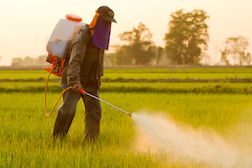“Existing data, while not systematic, indicate GBHs and metabolites
are widely present in the global soybean system and that human exposures
to GBHs are clearly rising,” the study
authors wrote, in their conclusions. “Tolerable daily intakes for
glyphosate in the US and Germany are based upon outdated science.
“Taken together, these conclusions all indicate that a fresh and
independent examination of GBH toxicity should be undertaken, and that
this re-examination be accompanied by systematic efforts by relevant
agencies to monitor GBH levels in people and in the food supply, none of
which are occurring today. The US National Toxicology Program should
prioritize a thorough toxicological assessment of the multiple pathways
now identified as potentially vulnerable to GBHs.
“The urgency of
such work was reinforced in March 2015 when the IARC [International
Agency for Research on Cancer, World Health Organization] concluded
glyphosate is a probable human carcinogen,” the study authors conclude.

